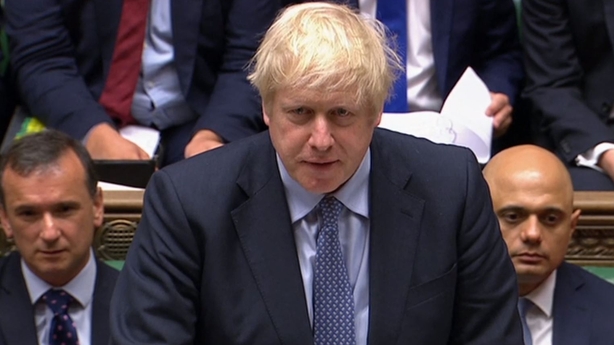EU ambassadors have postponed a decision on how long to delay Britain's exit from the bloc until next week, diplomats have said after talks in Brussels.
The 27 member states agree in principle that Brexit should be delayed beyond the end of the month, but talks are ongoing about how much longer to wait.
The ambassadors agreed that the decisions could be made by written procedure, rather than an emergency leaders' summit, but their next meeting is on Monday or Tuesday.
After what EU negotiator Michel Barnier said were "excellent discussions", European Commission spokeswoman Mina Andreeva said "work will continue in coming days".
Two diplomats said the ambassadors set an informal deadline of late Monday or early Tuesday to decide - just two days before the current Brexit deadine of 31 October.
European Council President Donald Tusk has recommended a three-month extension until 31 January, following a request from the UK government.
Ahead of the meeting today it was widely thought EU ambassadors would agree to a so-called "flextension" to the end of January, with the option for the UK to leave before then if there is agreement in parliament on a deal.
Such a move would be in line with the request that Mr Johnson was forced to submit under the terms of the Benn Act after he failed to gain approval for his deal at Saturday's special sitting of parliament.
This approach enjoys the support of key figures such as Taoiseach Leo Varadkar and German Chancellor Angela Merkel.
French President Emmanuel Macron, though, is reported to be pressing for a much shorter delay to the middle of November to keep the pressure on MPs at Westminster.
We need your consent to load this rte-player contentWe use rte-player to manage extra content that can set cookies on your device and collect data about your activity. Please review their details and accept them to load the content.Manage Preferences
Read more:
Boris Johnson to seek December general election
Latest Brexit stories
Meanwhile, EU Trade Commissioner Phil Hogan said there will not be a no-deal Brexit, despite the continuing uncertainty in the UK parliament over the future of the current government.
Speaking to RTÉ News in Kilkenny, Mr Hogan said that the "revised deal" agreed between the UK and the other 27 member states is "a very big success" for the Irish Government as it protects all of the priorities identified by Ireland during the Brexit process.
"There won't be a no-deal Brexit, there won't be a crash-out of the United Kingdom from the European Union," Mr Hogan said.
"Boris Johnson had to, of course, eventually come to the realisation that he had to seek an extension of membership of the UK of the European Union.
"It’s a question of how many weeks or how many months will be agreed at this stage. Hopefully it will be agreed today."
On the deal itself, Mr Hogan said: "It achieves the objectives that were set out by the European Union, it achieves the objectives set out by the Irish government in relation to an all-island economy; no hard border on the island of Ireland; protection of the Good Friday Agreement; frictionless trade between the island of Ireland and the European Union; and this was a very big success for the Irish Government, for the European Union and shows the great solidarity that there was with Ireland by the other 26 member states at a very difficult time for Ireland.
"There won’t be a crash-out, I think there’s a great determination not only in Europe but in the House of Commons that this will not be the case."

Yesterday, British Prime Minister Boris Johnson said he would give MPs more time to scrutinise his Brexit Bill in exchange for them voting to have a general election before Christmas, on 12 December.
Mr Johnson will need Labour votes if he is to win the attempt on Monday, with a "super majority" of two-thirds of MPs required to get an election under the Fixed-Term Parliaments Act (FTPA).
Labour leader Jeremy Corbyn said his decision would come after inspecting the terms of any extension to Article 50 granted by Brussels.
If Mr Corbyn does not back the FTPA on Monday, it will be the third time he has been offered a general election and refused.
"Take no-deal off the table and we absolutely support a general election," he said.
Mr Johnson said it would be "morally incredible" if opposition MPs refused to go along with his plan now.
But they lined up to reject his proposed timetable, criticising it for still giving too little time for proper scrutiny of the bill in parliament.
The SNP, Liberal Democrats and Plaid Cymru, all roundly refused to give their backing to Mr Johnson's plan.
Dominic Grieve, one of the 21 MPs exiled from the Tories by the PM, also said he would not back the election plan, describing to BBC's Newsnight as a form of "blackmail".
Additional reporting Conor Kane, PA

